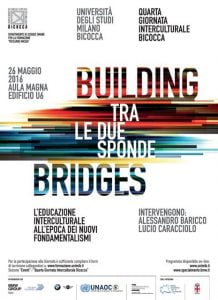
Abstract della relazione tenuta al convegno “L’educazione interculturale all’epoca dei nuovi fondamentalismi” – Milano, 26 maggio 2016, Università degli studi Milano Bicocca.
Esiste il fondamentalismo in musica? Probabilmente no, se ci si attiene al significato stretto del termine e al suo contesto religioso, ma non è così se con fondamentalismo s’intende il rifiuto della diversità e del cambiamento e l’ossessivo attaccamento alla propria tradizione musicale.
Questo atteggiamento è stato ed è molto presente nella storia della nostra estetica musicale e influenza l’educazione musicale. La nostra estetica ha sostenuto per decenni la superiorità della cosiddetta musica colta europea sulle altre e la storia della musica è stata vista come un catalogo di opere da fruire religiosamente. Di conseguenza, la pedagogia della musica ha costruito i propri cataloghi di opere “immortali” a cui gli allievi devono devotamente avvicinarsi ignorando tutto ciò che non ne fa parte. Questo atteggiamento si è esteso anche alla pratica musicale, limitata all’addestramento alla lettura scritta di un repertorio eletto, dimenticando tutti gli altri processi umani del fare musica.
Propongo di cambiare questa logica considerando come centro dell’educazione musicale soprattutto i processi e le condotte del fare musica come espressione dell’essere umano. Costruire ponti tra le culture significa interessarsi a tutte le manifestazioni dell’umano musicale e non solo a quelle dei grandi talenti della musica occidentale, sapendo che ogni essere umano può creare, eseguire, organizzare, interagire fisicamente ed emotivamente con la musica. L’etnomusicologo John Blacking ci insegna che tutti gli esseri umani sono anche esseri musicali ed è l’organizzazione della società in cui vivono che li aiuta a sviluppare la musicalità o, al contrario, a inibirla, come avviene nella nostra, a causa di una visione competitiva, selettiva, non sociale e non cooperativa della musica.
La musica è un bisogno essenziale dell’uomo, per questo essa è una pratica presente in tutte le culture e in tutte le epoche. Senza la musica l’essere umano non è completo. Il problema è che con il termine musica ci si riferisce a un prodotto più che a un processo umano. Per questo, credo che un progetto di educazione musicale interculturale debba assumere l’idea dei musicologi e pedagogisti anglofoni (Small, Elliott, Rice) che suggeriscono di modificare il sostantivo music nel verbo to music e quindi usare musicking o musicing per designare il fare musica, dato che la musica, per molte persone e per molti popoli e culture, è semplicemente qualcosa che si fa. Questo per centrare l’attenzione sugli elementi prassici e sulle condotte del fare musica. Ciò significa dare la giusta importanza all’improvvisazione e all’oralità, a un paradigma cooperativo e non solo all’esecuzione della musica scritta. Tali attività possono sostenere la costruzione di identità musicali aperte, dinamiche e molteplici, dal confronto delle quali può nascere una pedagogia della musica che sappia valorizzare e includere le diversità, non solo etniche ma anche di genere, di generazione, di religione e delle persone disabili.
Questa relazione nasce da una ricerca da me condotta presso l’Université Libre de Bruxelles per la tesi di dottorato Modèles d’éducation musicale interculturelle. Les diversités culturelles en éducation musicale (2012), con l’obiettivo di contribuire alla costruzione di un paradigma interculturale per l’educazione musicale. Lo sfondo teorico integra nel progetto pedagogico soprattutto l’etnomusicologia (Blacking, Rice), la psicologia culturale di Bruner, le ricerche psicosociali sull’identità di Camilleri e i contributi degli autori del May Day group statunitense (Elliott, Regelski e altri). La ricerca parte dal confronto tra le situazioni dell’educazione musicale in diversi paesi europei, ne valuta l’attenzione prestata all’interculturalità nei programmi e nelle pratiche per formulare proposte di innovazione e cambiamento. Parte della ricerca è pubblicata nel testo: Maurizio Disoteo: Musica e intercultura. Le diversità culturali in educazione musicale (Milano, Franco Angeli, 2014).
Building bridges in music
Could we speak of fundamentalism in music? Probably not, if we refer to the contemporary meaning of the word ‘fundamentalism’ and to its religious sense. However, such a thing does exist if by fundamentalism we mean the rejection of cultural diversities and transformations, and an obsessive attachment to one’s own musical tradition. Actually, such a fundamentalist attitude has shaped our musical aesthetics and determined our music education. our aesthetics has long since claimed the superiority of western classical music on other traditions, and our history of music has been conceived as a catalogue of works to be approached religiously. Music education has thus drawn up its own catalogues of ‘immortal’ masterpieces that pupils must admire and worship without having any knowledge of other kinds of musical traditions. This universalistic prejudice affects also the practice, conceived as a training to perform a selected repertory of these works – all written – while neglecting all other human processes of making music. My suggestion is that we move away from such frame of mind. In a new perspective, we should study the process of making music and the human behaviour involved in it, and not only the product. Building bridges between cultures means to investigate all the musical acts of the human being, rather than the performances of selected great musical talents. Every human is musical to some degree and s/he can create, perform, organize, and react physically and emotionally to music. Music is a primary human need in every culture, at all times – and without music humankind is not complete. Ethnomusicologist John Blacking argues that all human beings are also musical beings, and the social organization they live in either helps them develop their musicality or leads to their de-musicalization. Many young people lose their musicality because our society does not promote a cooperative idea of music but rather a selective, competitive and asocial one. Unfortunately, with us the term ‘music’ refers to a product rather than a human process. An intercultural music education project should adopt the position of Anglophone musicologists and educators who suggest using the verb to music instead of the noun music and then say musicking or musicing to define the process of making music. Actually, in many cultures music is simply something that is made. This new attitude requires us to develop a cooperative paradigm of music education and pay more attention to improvisation and oral thinking. All these activities can support the development of open, dynamic and multi-faceted musical identities. The dynamic relationships among these identities could be the foundations of an intercultural music education, and would include and enhance cultural diversities, also with reference to gender, generation, religion, and diverse abilities This paper is derived from part of my research at the Université Libre de Bruxelles for my PhD thesis: Modèles d’éducation musicale interculturelle. Le traitement des diversité culturelles en éducation musicale (2012). The aim of my work is to contribute to developing an intercultural, inclusive paradigm in music education. The theoretical background includes contributions from ethnomusicology (Blacking, Rice), cultural psychology (Bruner), USA pedagogic studies May Day Group (Elliott, Regelski), intercultural psychosociology (Camilleri). My research starts from an investigation of the state of music education in various European countries, the attention to multiculturalism in programs and practices and eventually proposes innovations and changes in music education curricula. A part of this work was published in Maurizio Disoteo, Musica e intercultura. Le diversità culturali in educazione musicale (Milano, Franco Angeli, 2014).
Bibliography:
Blacking John: How musical is man?, University of Washington Press, 1972.
Bruner Jerome: Acts of meaning, Harvard University Press, 1990.
Camilleri Carmel, Cohen-Emerique Margalit (ed): Chocs de cultures: concepts et enjeux pratique de l’interculturel, Paris, L’Harmattan, 1989.
Elliott David J: Praxial Music Education, Oxford University Press, 2005.
Piatti Mario: Progettare l’Educazione musicale, Bologna, Cappelli, 1993.
Schippers Huib: Facing the music. Shaping music education from a global perspective, Oxford University Press, 2011.
Shehan Campbell Patricia, Schippers Huib (ed.): Cultural diversity in music education, Australian Academic Press, 2006.
Small Christofer: Musicking. The meaning of Performing and Listening, Middletown, Wesleyan University Press, 1998.

